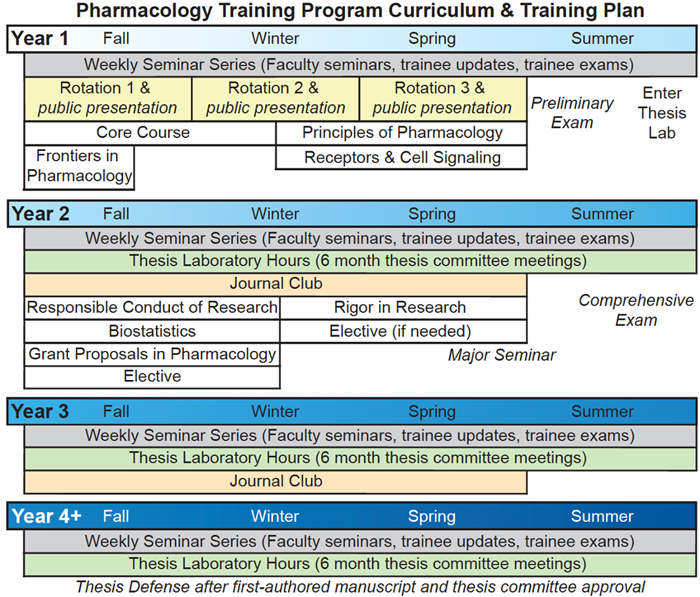CURRICULUM
Learning Outcomes for the Pharmacology and Molecular Medicine PhD Program
1A. Graduate education in general
Doctoral education is the foundation of future scholarship and the primary “engine” driving the research enterprise. It prepares future faculty and leaders in the academy as well as in many other areas of industry, government, and society in general.
1B. Pharmacology program in specific
The excellence of our Graduate Program in Pharmacology is best illustrated by the fact that our NIH-sponsored pre-doctoral T32 Training Grant has been continuously funded since 1978, making it one of the longest standing pharmacology training programs of this type.
The philosophy of our graduate program is to emphasize state-of-the-art research approaches at all stages; and that begins with the recruitment phase. We identify candidates with excellent undergraduate academic credentials, with a strong preference for those who have participated in independent research. During the first year in the program, students must complete three formal laboratory-based research rotations. Each research rotation is intended to examine testable hypotheses, as well as to provide exposure to new laboratory techniques. At the conclusion of each rotation, a post-rotational seminar is presented to the Department. To enhance research exposure further, the Department offers a special course on Frontiers in Pharmacology to our first-year students.
During the first two years in the program, students are required to take a number of courses to prepare them for research careers in pharmacology. These include a core course in molecular and cellular biology overseen by the Graduate School, and Program core courses in Cell and Molecular Signaling and Principles in Pharmacology. Additional requirements include courses in Ethics, Biostatistics, and Reproducibility & Rigor. During the second year, a number of electives are also available emphasizing topics such as: neuropharmacology/neurobiology and cancer biology, bioinformatics, and structural biology.
The PhD program in pharmacology trains graduate students to become proficient and successful investigators who are able to:
- Demonstrate a basic knowledge of central concepts of the biomedical sciences.
- Understand the historical basis as well as current concepts in the scientific discipline of pharmacology.
- Read and critically evaluate scientific literature relevant to pharmacology, in specific, and the basic and clinical biomedical sciences, in general.
- Formulate hypotheses based on current concepts in the field and design, conduct, and interpret their own research projects.
- Writing: Present research results in peer-reviewed publications and in their doctoral dissertation.
- Speaking: Communicate research results effectively through oral presentations at scientific seminars, conferences, and other venues.
- Understand the basis of writing and submitting competitive applications for research funding.
- Develop ancillary skills, where necessary, to obtain positions outside of scientific research.
- Be competent in self-evaluation of acquired skills and understand how those skills may be perceived by external peers.
- Develop a mature and meaningful Personal Development Plan (PDP) that will facilitate attainment of career objectives.
Curriculum Overview
The Pharmacology Training Program attempts to allow for individual flexibility while providing a common core experience for every student.
Required Courses | Students must maintain a minimum of a ‘B’ average in all required courses. In addition to course requirements, second-year students must also fulfill the Major Seminar requirement during the spring semester.
Electives | Each student is encouraged to choose electives that match his or her interests.
Rotations | With the exception of MSTP students, each student must do three research rotations in different laboratories.
